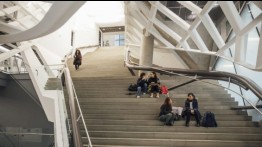Shoop's Stoop - March 2021 Newsletter
POSTED ON: March 30, 2021

Welcome back to Shoop’s Stoop! Thank you for joining me as I provide a brief glimpse into some of the exciting things that are happening in the School of Engineering.
Recall that in the fall semester we launched several new curricular initiatives. We launched a new type of course structure known as Vertically Integrated Projects (VIP), offering three VIP courses in both fall and spring semesters: one on the topic of Smart Cities, another focused on Solar Decathlon and the final one is Cooper Union Motorsports. I am pleased to share that our Solar Decathlon team has qualified as one of the 63 Finalist Teams in the U.S. Department of Energy Solar Decathlon 2021 Design Challenge. The Finalist Teams will present their projects to juries during the virtual Competition Event, April 15‒18, 2021. Additionally in curriculum innovations, a group of faculty reimagined EID101, Engineering Design and Problem Solving, integrating a consistent design process across all six-sections, with common milestones, deliverables and rubrics and the addition of 18 student mentors for project teams to help with community building and student support as well as technical assistance on the projects. I encourage you to read the details of this exciting initiative in an article in this newsletter.
The composition of the engineering faculty continues to change as we hired four new full-time, tenure-track faculty who will join us in the fall semester of 2021. Kamau Wright will join the Department of Mechanical Engineering and comes to us with an undergraduate degree from Howard University and Ph.D. from Drexel. He was previously a Visiting Professor at Stevens Institute of Technology and is completing nearly five years teaching experience at the University of Hartford. Michelle Rosen also joins the Department of Mechanical Engineering from Harvard University where she received her Ph.D. and completed three years as a Lecturer in Mechanical Engineering Design. I would be remiss if I did not note that in addition to her focus on bio-inspired robotics, Michelle was the Season 34 Jeopardy! Champion. Abigail Raz joins the Department of Mathematics with an undergraduate degree from Wellesley College and Ph.D. from Rutgers University after completing three years as the Edith T. Hitz Postdoctoral Faculty Fellow at the University of Nebraska at Lincoln. Abigail is also a Mathematical Association of America Project NExT (New Experiences in Teaching) Fellow. Additionally, we are in the final stages of hiring a physics candidate to fill the new joint faculty position between the School of Engineering and the Center for Computational Astrophysics (CCA) of the Simons Foundation’s Flatiron Institute. I will share this result in our next newsletter.
On February 10, 2021, several of our engineering alumni were recognized at the CUAA Founder’s Day Award Ceremony: Jennifer Fenton Weishaupt ChE’95 received the Peter Cooper Public Service Award, Stephen P. Welby ChE’87 the Gano Dunn Award, and Anna Brook BSE’04 the Young Alumna of the Year Award. Their backgrounds, accomplishments and contributions are highlighted in an article in this newsletter.
Our students continue to strive for and achieve excellence. Yuval Philipson, a senior mechanical engineering student, won first place in the Physical Acoustics Technical Committee student paper competition with his paper “Application of a dual stage exhaust system using expansion chambers for Formula SAE” which was published in the Journal of the Acoustical Society of America. Yuval was advised by Visiting Professor Martin Lawless ME'13. Additionally, six electrical engineering students, comprised of two teams, competed in the annual, regional Association of Computing Machinery (ACM) Programming Contest. The six comprised a combination of junior, senior, and graduate students included Andrey Akhmetov, Zachary Friedman, Chanoch Goldfarb, Jonathan Lam, Derek Lee, and Zhihao Zhang. The students were advised by Professor Carl Sable. Most schools that participate in this competition have computer science departments, including computer science majors and computer science graduate students. The two Cooper Teams ranked 8th and 16th out of 54 competing teams. Finally, just prior to publishing this newsletter we were notified that Alexa Jacob, a junior electrical engineering major, received the 2021-2022 Goldwater Scholarship, which is a prestigious undergraduate scholarship award for engineering, mathematics and natural science research. Our students Rock!
In another dimension, the scholarly efforts of Professor Robert Q. Topper and Cooper alumna Anna Joselle Lomboy ChE’18 MChE’20, have been accepted for publication. Using computational quantum mechanics software and high-performance computing platforms, they completed and released a study entitled “Nonuniform Proton Transfer and Strong Hydrogen Bonding within Cation, Anion, and Neutral Clusters of Ammonia and Hydrogen Fluoride” which has been accepted for publication in the Journal of Physical Chemistry A.
Thank you for sharing some of your valuable time! You should know that these are just a few of the highlights – the tips of the waves. There are many more great things happening in the Albert Nerken School of Engineering. I look forward to sharing additional updates in future editions of Shoop’s Stoop!

Barry L. Shoop, Ph.D., P.E.
Dean of Engineering
Albert Nerken School of Engineering




